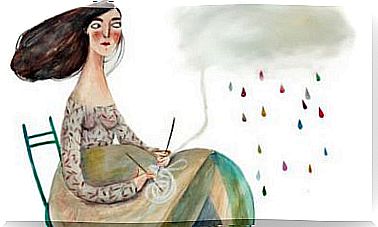Impulse Control: How To Teach Children?

Many child behavior problems are due to a lack of impulse control. The ability to control impulses requires learning a set of skills that must be trained in order to learn how to manage this impulsivity.
Children who have difficulty controlling impulses have trouble stopping to think before acting. Also, young children tend to act on their emotions, without thinking about the consequences. Teaching children strategies for controlling their impulses is an important task that needs to be done since they are two years old.
Most children learn impulse control skills between the ages of 2 and 5, but older children sometimes continue to have problems with impulsivity. With a little practice and dedication, your child can learn to control his emotions and think about his actions before carrying them out. Below we will look at some of these strategies.
Talk to your children about their feelings
When children understand the difference between feelings and behaviors, they are more likely to begin to understand how they can control their impulses. A child who understands that it is normal to feel angry but that it is not okay to hit is able to realize that he has options when he has to deal with his feelings without reacting impulsively.
Understanding emotions is also a key point in helping your child to be mentally strong, which is necessary for them to become a responsible adult. One of the fundamental points for the child to be mentally strong is that he is aware of his emotions. It is not about suppressing feelings, but about teaching them to choose healthy strategies to deal with them.
Train him in the ability to listen
Sometimes children behave impulsively because they don’t listen. In fact, it is normal for children who have problems controlling their impulses to get up and leave before the adult has finished speaking or to constantly move while being talked to.
If you want your child to learn to control his impulsiveness you will need to teach and train him in the ability to listen. This cannot be done by shouting or repeating the same things a thousand times. To begin, you need to be able to get the child to put himself into a listening situation and you don’t have to talk until he gives you his full attention. And if she stops paying attention, stop talking and attract her again.
Teach them the ability to solve problems
Teaching your child to solve and manage his problems will give him confidence, which will help him better control his impulses. Many children lose control solely from the frustration of not knowing how to cope with a difficulty or conflict.
When children have little ability to solve problems, they look for ways to avoid having to deal with them. Getting carried away by this frustration is one way to do this. In addition, it is likely that, not knowing how to deal with them, they do not even recognize the fact that they have a problem. Therefore they react impulsively, without thinking about the various options.

Teach him the ability to control anger
Low frustration tolerance leads to a great deal of behavioral problems. Therefore, you must teach your child how to manage his anger, so that he can calm down when he is annoyed. Strategies like “pause” can help and teach your child to calm down on their own. For this strategy to work, however, it must not be used as a punishment. Thus, the child will be able to use the moment of “pause” for himself, as an option to control anger in a given situation.
Make the house rules clear
Creating clear rules so that your child knows what is expected of him will give him options when it comes to controlling his impulses. A child who knows what to do is easier than impulses, especially if the consequences of breaking the rules are clear.
In this sense, it is important to be consistent and to enforce in a particularly strict way the rules relating to routine. Routine limits the chaos, which could lead to a reduction in impulsivity. A regular child stays more focused.
To help him control his impulses, offer an appropriate role model
Your child will learn a lot about how to control their impulses by observing adults, especially their parents. If parents are having trouble controlling anger and managing their impulses, if they scream at problems, or take on things violently when frustrated, they are offering a very negative model of impulsivity control.
A good way to lead by example is to use internal dialogue, speaking aloud to yourself when facing a problem. This can help your child develop his own internal dialogue, which will help him manage his impulses. Making overcoming problems a priority in your life is the best way to teach your child to control their impulses.









